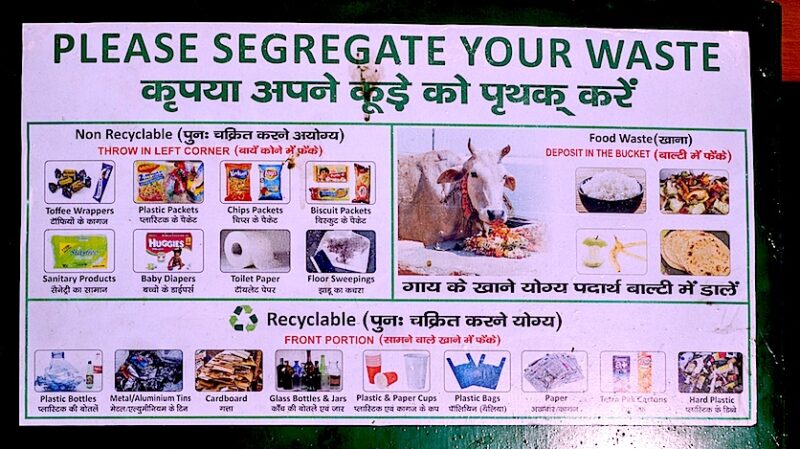When Manisha Anantharaman, a former advanced doctoral student in UC Berkeley’s Environmental Science, Policy, and Management program, was a child in Bangalore, India in the late 1980s, her aunt would come to visit from the U.S. “We didn’t have this thing called hair conditioner,” recalls Anantharaman, who is now an assistant professor at Saint Mary’s College of California. “My aunt would bring this Herbal Essences product in a blue bottle. It was so exotic.”
Such products were about to become commonplace in India: by the time Anantharaman left to attend Oxford University, the city of Bangalore had changed dramatically. India had seen sharp increases in foreign investment during the late 1980s and early 1990s, and a new wave of middle-class, technology-oriented jobs were moving into call centers and offices. At the same time, foreign companies were starting to look at India as a major market for consumer products.
In cities like Bangalore, a new class of white-collar workers moved into new, exclusive apartment complexes “and bought many, many things,” Anantharaman says. With the consumption came many empty conditioner bottles, not to mention mounds of other waste. In these new, middle-class neighborhoods, the amount of trash rapidly became a problem, as it taxed the city’s infrastructure and planning. Some new housing complexes had been built without access to proper disposal sites, and residents paid trucks to haul their refuse out of the city. The administrators of the growing city followed suit, rarely asking where or how the refuse was handled.
Today, the metropolis of Bangalore—with a population of 8.5 million—produces nearly three thousand tons of trash per day, and overflowing garbage bins, trash-lined streets, and international headlines like “Garbage Everywhere” have threatened to undermine the image of Bangalore as India’s Silicon Valley. “The outskirts [of Bangalore] are riddled with dumps, many of which are built on farmland and leach toxic chemicals into rural water supplies,” Anantharaman says. In 2012, violent protests broke out at local dumps, where villagers were tired of losing their farmland and water to the city’s garbage.
For the mostly upper-caste middle class, Anantharaman explains, dealing with garbage has traditionally been considered beneath their status, and even touching garbage was considered to be the job of lower-caste house workers. In the light of the city’s garbage crisis, however, this perception is changing, as Bangalore’s well-to-do have started to treat the byproducts of their buying habits as a problem. Anantharaman credits international ideas about environmental citizenship and “green” living. “[Indians] visit the Bay Area for a few months at a time and pick [sustainable practices] up here, and then there’s the Internet,” she says.
In recent years, being “green”—by recycling glass, plastic, paper, and other household waste, and composting kitchen scraps—has become a marker of class for many in Bangalore. Since the values of sustainability are associated internationally and locally with prosperity and privilege, “using environmental discourses allows the middle classes to adopt and promote practices that are traditionally associated with poverty and deprivation, without conceding their social status,” Anantharaman says. “This has less to do with overt care for the planet. It’s really a way of dealing with anxiety about privilege in India and living in a ‘world-class’ city.”
In an article published in 2014 in the Journal of Cleaner Production, Anantharaman details her fieldwork, for which she spent over a year in Bangalore, observing how communities make decisions about waste, conducting in-depth interviews, and using what she calls “netography”—participating and reading online discussion boards related to recycling. Her article highlights “how household behavior change is made possible by neighborhood-based coordination, involving multiple actors such as environmentally-conscious residents, domestic help, and hired waste workers.” Drawing on “ecological citizenship theory” (which frames “green” behavior as being carried out for the common good), she discusses “how waste management through recycling and composting is being implemented in Bangalore through networks of socio-economically privileged new middle class individuals.”
She looks at examples of local, decentralized efforts to promote recycling, including a residential waste management program operating in one of Bangalore’s large gated communities, where residents work with their paid housekeepers to separate waste, and to promote adoption by neighbors with the support of “champions” and pro-recycling stickers. From her research experience—tied to her own roots in the city—her research highlights the complexities of environmental movements around the world. “The concept of ecological citizenship,” she argues, “because of its focus on the citizenship practices of ecological debtors (the new middle classes) and limited treatment of the role of ecological creditors (paid labor from the working classes) fails to recognize the contributions of those actors, who through their livelihood practices, play a pivotal role in producing the systems that enable pro-environmental behaviors among the elite.”
She also reflects on the importance of social status and other drivers in motivating people to adopt more sustainable practices, as doing right by community norms is often as powerful a motivator as doing right for the planet. “Being green is never just about nature,” she says. “It also involves our class identification and political privilege.”



